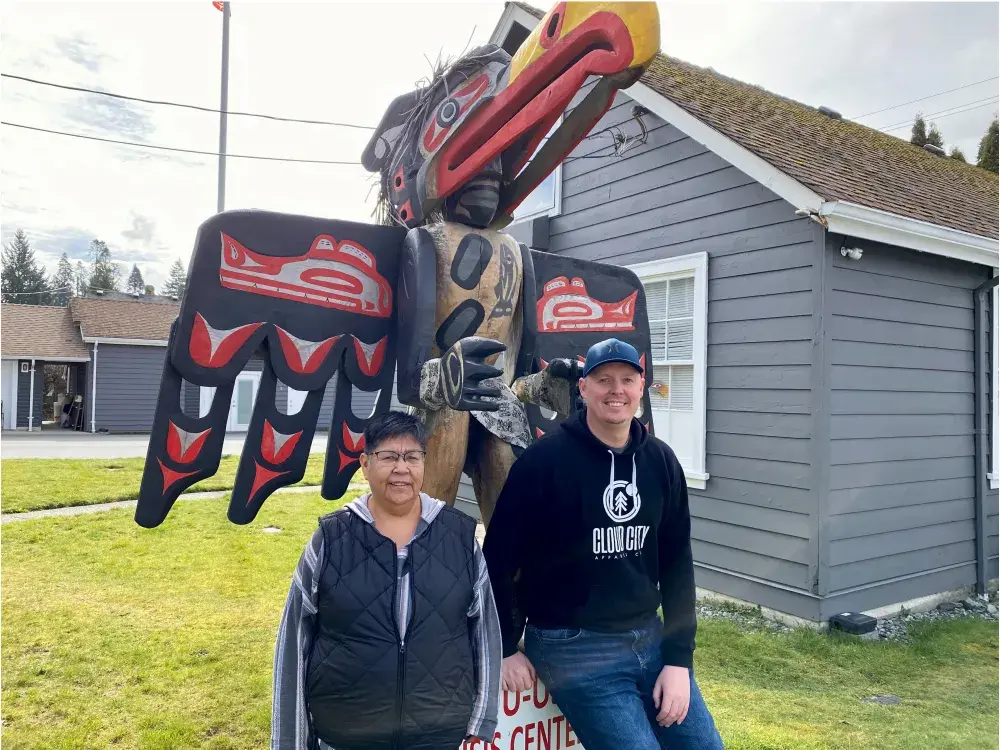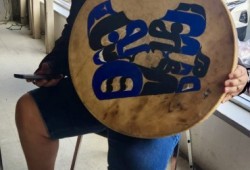Through traditional songs, food and medicine, homeless individuals who identify as Indigenous are receiving much-needed cultural healing in the Alberni Valley.
Culture Enriches Lives, a newer event put on by KUU-US Crisis Line Society in collaboration with other service providers, provides cultural healing, teachings, food and gathering for the unhoused Indigenous community.
KUU-US cultural support worker Alice Sam, from the Ahousaht First Nation, said the idea for Culture Enriches Lives came about because she was hearing feedback from the homeless community that Indigenous people were feeling left out of potlaches and other events they consider part of their culture.
“In Vancouver there's one called Culture Saves Lives…I was like, wow these guys get to drum and participate in dream catcher making. I thought it would be so amazing if we could do it here,” Sam said. “My idea is also to bring healing through song, food, medicine and also allow [the homeless] to address some of the trauma that they’ve suffered.”
The first event began last summer and would run once a week at various locations where homeless individuals tend to be, like the Overdose Prevention Site on Third Avenue, the shelter on Eighth Avenue or the Bread of Life.
Sam organizes singers and drummers who perform traditional Nuu-chah-nulth songs to be at the events and provides food and drinks for attendees.
Resources and a chance to discuss important issues like dealing with grief are also provided.
“One of the things that hit home really hard was the grieving process with our people and how we do it and how we go sit with our grieving families and we feed them,” Sam said. “I thought, what do the homeless get? So that was one of the processes I really looked at, was the grieving process, because at that second or third session we had a lot of loss.”
Data from the 2023 homeless count for Port Alberni showed 163 individuals who identified as homeless. This means that 66 per cent of the homeless counted identified as Indigenous, compared to 15 per cent of Port Alberni’s census population.
Instead of providing an official invitation for each event, Sam finds it more successful to gather folks outside of the locations the event will be held that day.
The gatherings took a short pause for KUU-US to secure funding and should resume in the coming weeks.
“In partnership between KUU-US and Tseshaht First Nation we applied for an FNHA (First Nation Health Authority) harm reduction grant and were successful in getting it for $50,000,” said Colin Minions, executive director for KUU-US. “That will provide stability to the program.”
Culture Enriches Lives has also received donations from community organizations and individuals since its inception that has helped keep it running.
Minions added that it’s important to continue working towards cultural revitalization through traditional song, food and language, while making sure it’s accessible for all.
Since beginning the sessions, Sam said they’ve received positive feedback from attendees.
“We've had some people saying things like, ‘You've given us hope’ or ‘You woke my spirit’,” Sam said. “We’ve actually had a couple people say it made them realize they want to go to treatment, they want to get better.”
The Victoria-based Aboriginal Coalition to End Homelessness (ACEH) has also seen success amongst their Indigenous clients (who they refer to as family members) who have access to cultural-supportive resources.
Julia O’Quinn, director of community programs and impact with ACEH, said one of their first family members who was unhoused for more than 35 years was finally able to accept help with treatment after attending a culturally supportive, land-based healing camp with the coalition. He has now been housed for three years.
“Our focus is on supporting our unhoused First Nations, Métis and Inuit people that are here, sort of in an urban centre,” O’Quinn said. “We continue to be the only Indigenous-led, non-profit organization based on this territory that's supporting our people.”
The coalition currently operates two culturally supportive housing programs, one of which is for Indigenous women, with priority given to those fleeing violence. O’Quinn said there are three or four Ahousaht members accessing this program, but the coalition also serves many Nuu-chah-nulth individuals.
“When we did our original intake for the program we had 21 units and we had over 90 referrals for the program. The need is outpacing what were able to offer,” O’Quinn said. “We’ve been able to do teachings around regalia for the women that are there…for some it was the first opportunity in their life, so that was a really powerful healing opportunity.”
O’Quinn added there’s also a large gap in culturally supportive programs and housing for Indigenous youth in care, something the ACEH continues to work towards.
“A lot of our young ones might be being raised by non-Indigenous families so we try as best as possible to connect with the young ones as well,” O’Quinn said. “How to prepare them for adulthood because we see so many age out into homelessness. It’s as important to address the immediate need to those that are unhoused as it is to do that prevention work to break those cycles of intergenerational homelessness.”
In two weeks, the ACEH will open a new culturally supportive house for Indigenous youth in Victoria.
“That’s the first one that exists here, so when you think about that over 50 per cent of the youth in care are Indigenous but there’s not Indigenous-led programs, well no wonder it’s not working for our people. So that’s a really huge barrier,” O’Quinn said.
Racism also continues to be a barrier that the Indigenous unhoused population are facing, in addition to the stigmatization that comes with being homeless.
“I think that also speaks to the importance of having an Indigenous-led organization,” O’Quinn said. “When you walk into a space you feel seen, you feel understood and you don’t have to explain yourself or your history.”


